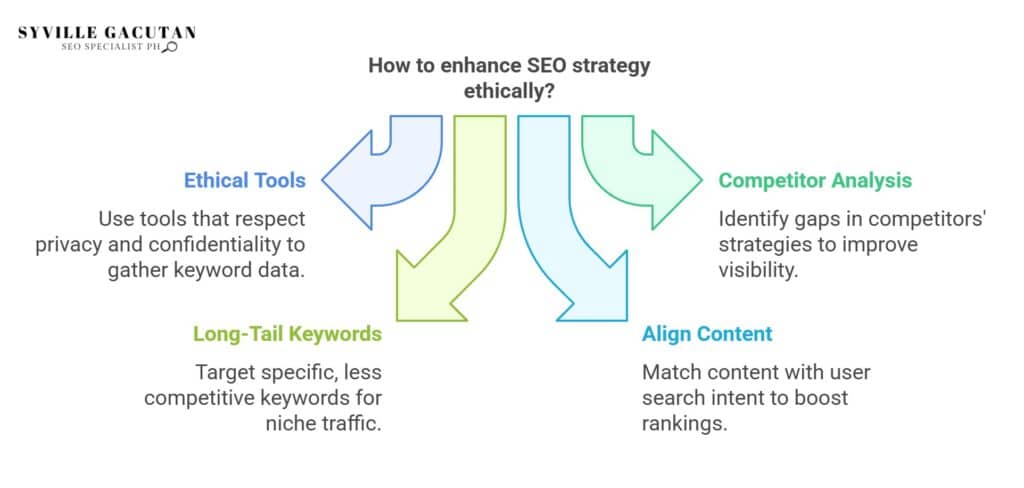
Ethical Competitor Keyword Analysis for SEO Edge
Ethical competitor keyword analysis improves SEO effectiveness by using insights from competitors without compromising integrity. It involves using tools to evaluate competitors’ keyword strategies, search volumes, and user intent, helping you spot areas where they rank well and opportunities where your brand can excel. By focusing on transparency and avoiding negative or black-hat SEO techniques, you can build a trustworthy online presence that leads to long-term success. This approach not only refines your content to better meet user needs but also helps you outshine competitors in search results. A well-rounded strategy ensures both a competitive edge and a healthier digital ecosystem. Exploring more ethical competitor keyword analysis strategies can help maintain this balance.
Key Takeaways
- Use ethical keyword research tools: Gather data on competitor keywords responsibly, without accessing any confidential information.
- Analyze competitors’ keyword strategies: Look for gaps in your competitors’ strategies that your site can target to improve visibility and stand out.
- Focus on long-tail keywords: Discover niche opportunities by targeting less competitive, specific keywords that can drive more relevant traffic.
- Align content with search intent: Ensure your content matches what users are searching for to boost rankings and improve user satisfaction.
- Ensure transparency and ethical data collection: Follow privacy laws and industry standards, maintaining ethical practices throughout your SEO efforts.

Understanding Competitor Keyword Analysis

Competitor keyword analysis is the process of studying the specific words or phrases that your business competitors are using to attract customers online. This analysis helps you understand how your competitors are reaching and keeping their audience. By analyzing competitor keywords businesses can improve their own online strategies to attract more customers.
Utilizing keyword research tools is fundamental in this regard. These tools not only unveil the specific keywords competitors rank for but also provide crucial data on search volume and competition level, allowing for a comprehensive understanding of the landscape.
A critical component of competitor keyword analysis is search intent analysis. It involves dissecting the purpose behind a user’s search query, which can range from informational to transactional. By understanding the search intent, businesses can tailor their content to better serve potential customers’ needs, thereby increasing engagement and conversion rates.
Organic traffic insights further aid in evaluating which keywords drive the most traffic to competitor sites, offering a benchmark for your own keyword strategy.
Long tail keywords—those that are more specific and less commonly searched—are invaluable in this analysis. They often reveal niche areas where competitors might not have a strong presence, enabling businesses to capitalize on untapped opportunities.
Additionally, content gap identification is a strategic approach to uncover topics or keywords competitors have covered inadequately, providing a chance to fill these gaps with high-quality content.
Importance of Ethical SEO Practices

In the realm of digital marketing, adopting ethical SEO practices is crucial for building a sustainable online presence and maintaining brand integrity. Ethical SEO involves implementing strategies that not only comply with search engine guidelines but also focus on the long-term success of a business. By prioritizing sustainable practices, companies can ensure that their online activities contribute positively to their brand reputation and foster a sense of trust among their audience.
Transparency benefits are a significant aspect of ethical SEO. When businesses are open about their SEO strategies and intentions, they build credibility with both search engines and users. This transparency is a cornerstone of trust building, as it assures stakeholders that a company is committed to fair and honest digital marketing practices. Trust, once established, can significantly enhance customer loyalty and engagement, offering a competitive edge in an increasingly crowded marketplace.
Moreover, ethical SEO practices lay the groundwork for long-term success. Unlike black-hat techniques that may offer temporary boosts in search rankings but risk penalties from search engines, ethical strategies focus on sustainable growth. This approach not only safeguards the company against potential setbacks but also aligns with the evolving expectations of consumers who value corporate responsibility and ethical conduct.
Identifying Key Competitors
Every business seeking to enhance its online visibility must prioritize identifying key competitors. In the digital age, understanding the competitor landscape is crucial for establishing a strong market position. By pinpointing the right competitors, businesses can better comprehend their niche identification, enabling them to tailor strategies for brand differentiation and effective audience targeting.
The process of identifying key competitors involves several steps, each contributing to a comprehensive understanding of the competitive environment:
- Market Position Analysis: Determine where your business stands in the market and identify companies with similar positioning to assess their strengths and weaknesses.
- Competitor Landscape Examination: Explore the broader competitor landscape to identify both direct and indirect competitors that could impact your market position.
- Niche Identification: Focus on competitors operating within your specific niche to gain insights into specialized strategies and potential opportunities for differentiation.
- Brand Differentiation Assessment: Evaluate how competitors differentiate their services or products, facilitating the development of unique value propositions for your brand.
Understanding these elements allows businesses to craft strategies that effectively meet the needs of their target audience while setting them apart from the competition.
It’s essential to consider both traditional competitors and emerging players who might disrupt the industry. By thoroughly analyzing these factors, businesses can position themselves more strategically within their respective markets.
Analyzing Competitor Keyword Strategies

Keyword strategy is the cornerstone of effective SEO and a critical component in understanding competitor tactics. By examining how competitors utilize keywords, businesses can uncover keyword gaps—areas where competitors rank but your site does not. Identifying these gaps provides content opportunities to optimize and enhance your website’s visibility and relevance.
This process involves assessing which keywords competitors target and determining their alignment with search intent, ensuring that your content meets users’ needs and queries.
An effective analysis begins by evaluating competitors’ performance metrics. Tools like SEMrush or Ahrefs can reveal which keywords drive the most traffic to competitor sites. By understanding these performance metrics, businesses can discern which keywords are worth prioritizing in their own strategy.
This analysis can also highlight keywords with high conversion potential, guiding content development to capitalize on these opportunities.
Industry trends play a crucial role in shaping keyword strategies. Monitoring these trends allows businesses to adapt their keyword approach proactively, staying ahead of shifts in consumer interest and search behavior.
Incorporating trending keywords into your strategy can boost visibility and engagement, particularly if competitors have yet to capitalize on them.
Analyzing competitors’ keyword strategies demands a nuanced understanding of search intent. By aligning content with the intent behind search queries, companies can develop more targeted and effective content.
This not only improves search rankings but also enhances user satisfaction by delivering relevant information.
Respecting Competitor Boundaries

Navigating the competitive landscape of SEO requires a commitment to ethical practices, particularly in respecting competitor boundaries. As businesses strive for prominence in search engine results, it is crucial to maintain an ethical stance that fosters fair competition and mutual growth.
Competitor ethics are paramount in ensuring that companies engage in transparent analysis and avoid practices that could be deemed invasive or unfair. Respecting these boundaries not only upholds industry standards but also contributes to a healthier digital ecosystem.
To clarify what respecting competitor boundaries entails, consider these essential practices:
- Avoiding Plagiarism: Copying content or keywords directly from a competitor’s site undermines fair competition and can lead to legal repercussions.
- Transparent Analysis: Engage in open and honest evaluations of competitor strategies without delving into confidential or proprietary information.
- Avoiding Negative SEO: Refrain from tactics that deliberately harm competitors’ rankings, such as creating spammy backlinks or negative reviews.
- Ethical Data Collection: Use publicly available data and tools that comply with privacy laws and industry standards for gathering competitive insights.
Leveraging Data for SEO Improvement

Data is the cornerstone of effective SEO strategies, providing actionable insights that can significantly enhance a website’s visibility and performance. By leveraging sophisticated keyword research tools, businesses can unearth data driven insights that inform their SEO tactics, driving organic traffic growth and improving overall engagement.
These tools enable marketers to analyze search intent and pinpoint the keywords that hold the highest value in terms of search volume and relevance to target audiences.
A critical aspect of leveraging data is conducting thorough search intent analysis. Understanding what users are truly searching for allows businesses to tailor their content to meet specific needs, thereby increasing the likelihood of capturing valuable organic traffic.
By aligning content strategies with user intent, companies can enhance their position in search engine results pages (SERPs), ultimately leading to higher engagement and conversion rates.
Equally important is the continuous evaluation of performance metrics. This process involves measuring the effectiveness of SEO strategies by examining key indicators such as click-through rates, conversion rates, and bounce rates.
Performance metrics evaluation not only helps in identifying areas of success but also highlights opportunities for improvement. Consistently refining strategies based on this data ensures that SEO efforts remain aligned with evolving market trends and consumer behavior.
Avoiding Unethical Tactics

Ethical SEO practices are pivotal in maintaining a brand’s credibility and trustworthiness online. Avoiding unethical tactics is essential not only for fostering keyword ethics but also for ensuring competitive integrity.
In today’s digital landscape, where the boundaries of fair play can sometimes blur, adhering to ethical guidelines is crucial for sustainable growth and trust building.
To maintain competitive integrity and promote fair play, SEO professionals should steer clear of unethical tactics that may provide short-term gains but can harm long-term credibility. Below are some unethical practices to avoid:
- Keyword Stuffing: Overloading a webpage with keywords can lead to a poor user experience and potential penalties from search engines.
- Cloaking: Presenting different content to users and search engines undermines trust and can result in severe penalties.
- Link Schemes: Engaging in link buying or exchanging can manipulate search rankings and damage a site’s reputation.
- Content Plagiarism: Copying content from competitors without permission not only violates copyright laws but also damages trustworthiness.
By avoiding these unethical tactics and prioritizing keyword ethics, businesses can focus on creating valuable, original content that resonates with their audience.
This approach not only aligns with search engine best practices but also supports sustainable growth by building genuine connections with users.
Ultimately, emphasizing ethical SEO practices enhances trust building, ensuring that a brand’s digital presence reflects its core values.
Final Thoughts
Ethical competitor keyword analysis is crucial for building a trustworthy and sustainable SEO strategy. By focusing on transparency, respecting competitor boundaries, and avoiding unethical practices, businesses can maintain a competitive edge without compromising integrity. Leveraging data responsibly, aligning content with search intent, and filling content gaps ethically are essential steps for long-term SEO success. Prioritizing these principles not only strengthens your online presence but also fosters credibility and trust with both search engines and users, ensuring sustained growth in an increasingly competitive digital landscape.
If you’re ready to enhance your SEO strategy with ethical competitor analysis, connect with Syville Gacutan, an experienced SEO Specialist in the Philippines. Syville can help you uncover valuable keyword opportunities, optimize your content, and boost your search engine rankings—all while maintaining integrity and transparency. Don’t miss the opportunity to achieve sustainable SEO success—reach out today!